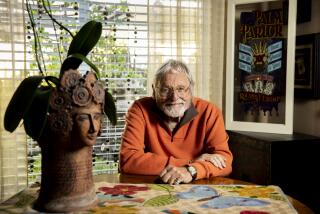The Proustian Moment of a Father’s Wink
- Share via
Not too long ago, a magazine asked me to write a piece about my father, Ronald Reagan. How he is doing; the slippage into Alzheimer’s. No, I replied, I’ve already written enough. I have said everything I need to say.
Over the past few years, I’ve tried, in articles I have written, to be honest, yet oblique at times, staying away from specific details of my father’s condition. I was also, at the time of this request, still reeling from a horrible tabloid cover story in which my brothers and I were accused of, among other things, exploiting our father’s condition for financial gain.
Added to that, the last article I wrote on the subject, for a German magazine, was faithfully translated into German but mutilated when retranslated into English. Apparently that assignment was given to an American journalist whose aptitude for the German language peaked in high school: Some of my images came out sounding like an idiotically bungled attempt at metaphor. Hence: my vow of silence.
Recently, details of my father’s condition have become news in print, on television. For a couple of days, I collided with them everywhere. The image that emerged was disturbing, an image of a man in great decline. This wasn’t necessary, I kept thinking.
Obviously, I have rethought my silence. I didn’t at first. I sat down to write this only after many people came up to me with sadness in their eyes, but also self-consciousness at knowing details they really didn’t want to know. One close friend said, “I have a different mental picture of your father now. I wish I didn’t.”
Mental images are hard to erase; we paint pictures of people from what we read and hear. They often replace the images that existed before, like a new photograph slipped in front of an old one. I’m writing this because I want to replace the photograph again; because my father deserves to have his dignity protected, preserved.
Anyone who is familiar with Alzheimer’s, who has been around the disease, knows there is great dignity in a human being’s capacity to wake up each day to a world increasingly difficult to recognize. It’s courage that comes from the deepest fathoms of the soul. When I look at my father, that’s what I see.
Recently, my brother, Ron, and I visited him, and his eyes drank us in, sparkled--maybe not as brightly as before, but brightly enough. What people say, or don’t say with words, is almost never the whole story.
I want you to know that he winked at me, which hadn’t happened in a while. I’ve missed his wink. I grew up with it. It says, “Come on, don’t take life too seriously.” And it’s always worked. When Ron and I left him, the first thing I said when we got into the car was, “He winked at me. Did you see that?” Ron nodded, knowing how much it meant. He grew up with that wink, too.
I want you to know that my father held onto my hand, his grip still strong, resilient. I want you to see his hands--older now, yes, but still the hands that built riding jumps from telephone poles, hoisted saddles and his small children onto horses, constructed science projects and assembled Christmas toys. His fingers grip my hand with all that history. No disease takes that away.
I want you to see my brother’s strong back as he hugged our father, kissed his forehead, their eyes meeting in some silent exchange more real than anything language could contain. I was looking at the cycle of life, the bending of one generation into another. It’s how he would want me to see it.
Here is a story you don’t know. Two and a half years ago, I walked with my father along the beach in Santa Monica. His Secret Service agents gave us as much room as they could--enough for some privacy. We passed a small girl, maybe 6 or 7, walking with her father, clutching his hand. I leaned closer to my father--I remember my ear brushed his shoulder--and whispered, “I’m sorry I was such a jerk for so much of my life. Can you forgive me?” He turned and looked at me with such lightness in his eyes, the corners crinkling into a smile, that I blushed as tears pressed into mine.
“Of course,” he said simply.
I want you to know this because some people will tell you Alzheimer’s’s steals everything. But it doesn’t steal the heart, and it doesn’t encroach on the soul.
My father’s soul shines through his eyes: That’s the image I want people to have. Because when his eyes close for the last time, a lot of people will say a lot of things. Newspapers, journalists, television reporters will try to ferret out other images, details and put them in front of you. I want you to see, instead, the hands that once lashed together two sticks to form a cross for a fish funeral when I was 7 years old and adamant about giving my fish a proper burial. Those same hands, 40 years later, held onto mine tightly.
I want you to see him winking because, if you do, you’ll be getting a glimpse into his soul. He would want you to have that. It’s the sanctuary no disease can enter.
More to Read
Sign up for Essential California
The most important California stories and recommendations in your inbox every morning.
You may occasionally receive promotional content from the Los Angeles Times.













